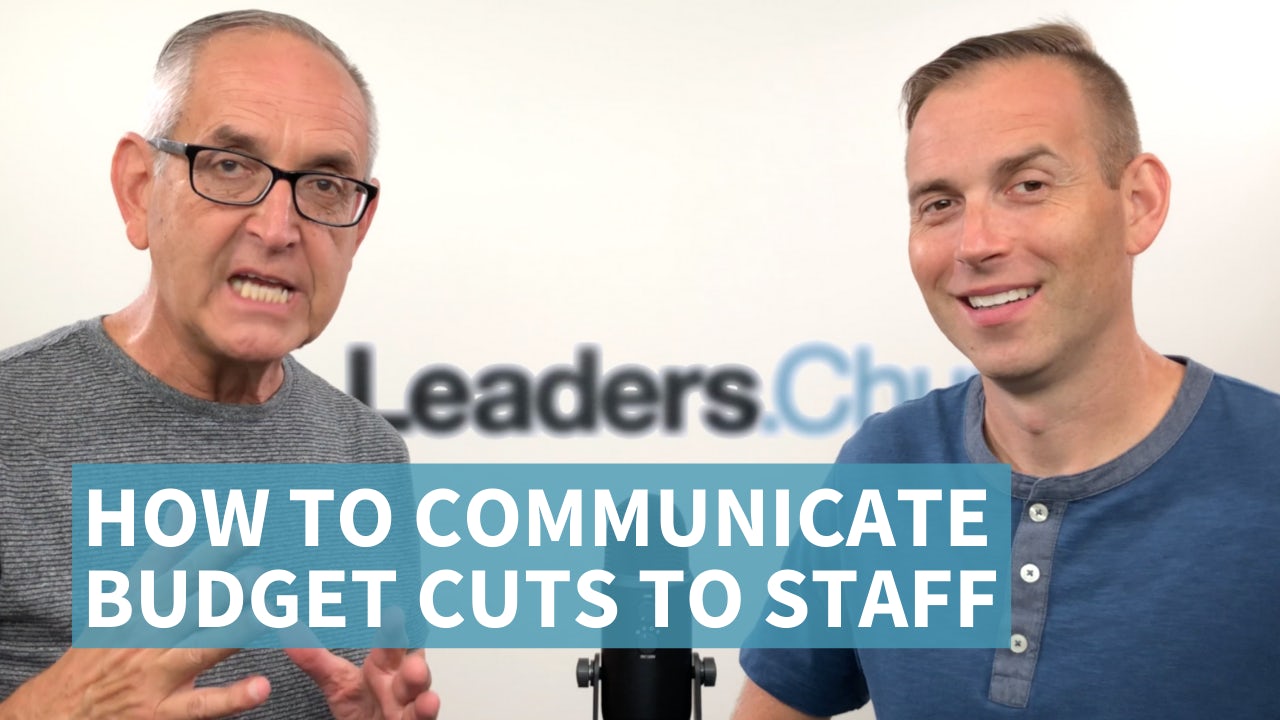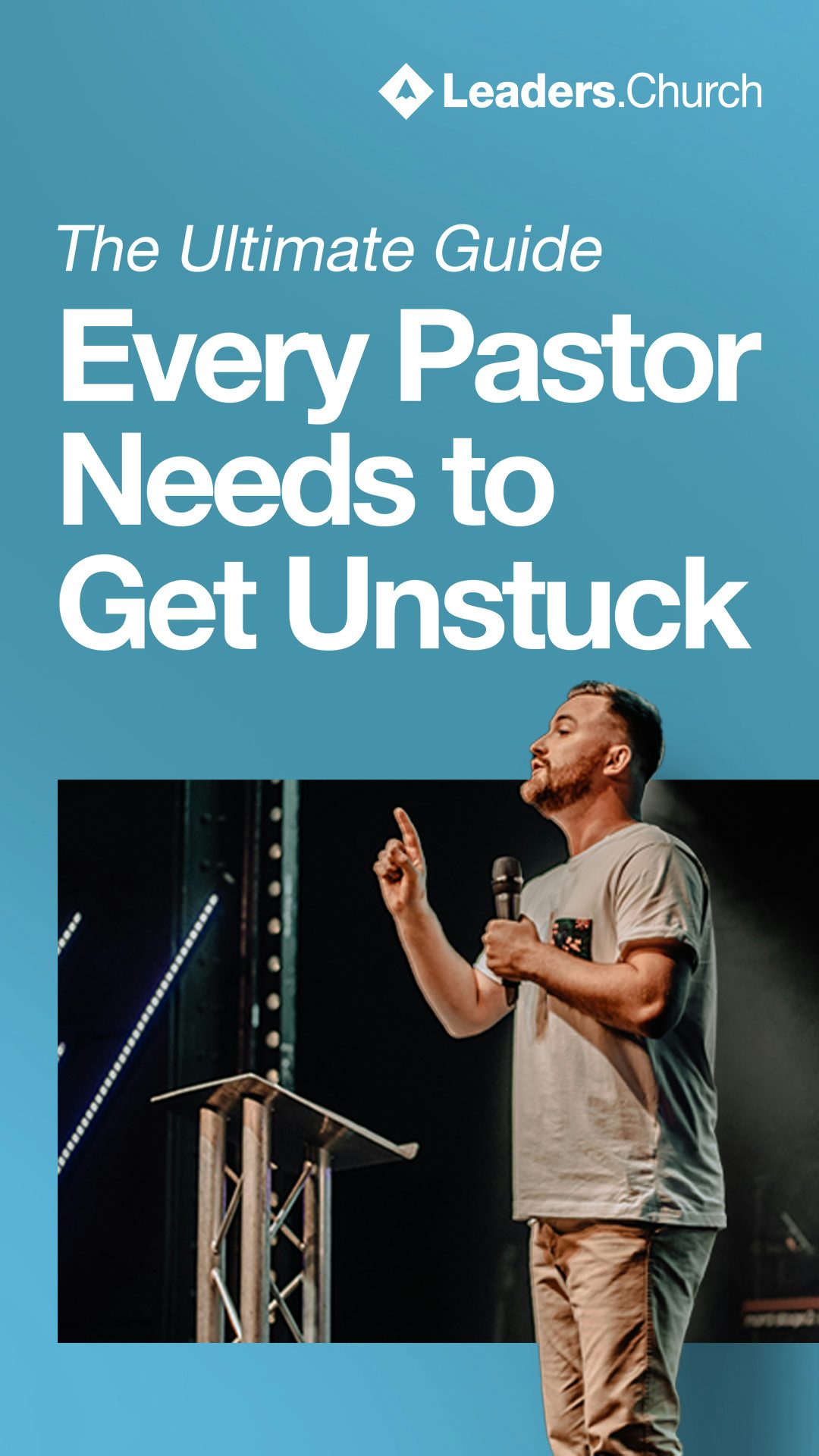060 – How to Communicate Budget Cuts to Staff
What’s in this Episode?
Budget cuts. Oh man, I just hate to even deal with those. But during this era of COVID, it seems like that’s all we do. Now, here’s the deal, it’s one thing to do those budget cuts. It’s something entirely different to communicate those cuts to the good staff and volunteers who worked and serve your church to make it move forward. How do you do that? That’s exactly what we’re going to talk about on this episode of the Church Tips podcast.
Read the Transcript
Dick Hardy 0:32
I remember back a number of years ago, I was meeting with a pastoral staff. And I think we even had some support staff in that particular meeting, where we needed to make… we had hit a point where we needed to make some very serious adjustments to the budget. Now when you’re going to do something like that, you don’t want to create a doom and gloom situation for people. So I had the unenviable task of talking to people about how budgets we’re going to be reduced, but how did the future was bright. And I think by and large, we were successful with that. But we had to navigate it very carefully to really help these people understand why these budget cuts were going to be good for the future. Now short term pain, but long term it was going to really help us for the future. So that’s what really what we want to talk about with you today, is how do you communicate these budget issues to people in a way that really is going to help move the church forward while you deal with the present reality of tightening things down? So anyway, you know, and you’ll know that we have talked about some of these budget things in past episodes. In episode seven, we talked about how to balance a church budget, which obviously this comes to play when you think you might have to do some cutting. And we, in Episode 27, we dealt with some of the actual cuts, how you actually do the cutting, but this one is focused on how do you communicate that? So anyway, Jonathan, get started with this, can you?
Tip #1: Prevent This Situation from Even Happening in the First Place
Jonathan Hardy 2:04
Well, the first thing you ideally want to do, honestly, is to prevent this situation from even happening in the first place. So, in reality, if you can prevent this then you don’t have to worry about it. And so I kind of wanted to qualify with that as really the first thought for the day is that you know, that means you need to plan right and plan accordingly and be paying attention to the numbers and I know a lot of pastors who don’t pay attention to the numbers like they should and you know, as long as the checking account has more money in it, you know, they kind of know well, we got these few expenses coming up, then well, we should be good but you know, we need to be a little bit more on top of things and even be able to forecast 30, 60, 90 even 100 days out of what you know, is the income, tithe or other income, is it decreasing kind of slowly or is it staying level? Is it increasing slowly? All those things are important to be paying attention to and so, you need to pay attention, forecast, do these things, so that way you can prevent this from happening in the first place.
Dick Hardy 3:06
Well, you and I’ve seen it on more than one occasion where a pastor is not doing that. And they pay the price, then they’re stuck, then they have to do this. This is not fun to be in this spot. So if you’ll plan ahead, you’re going to find yourself mitigating most of what we’re talking about today.
Tip #2: Coach the Core Leadership About How You’re Making These Necessary Adjustments
Jonathan Hardy 3:25
Yeah. So then the second thing is to coach the core leadership about how you’re making these necessary adjustments. So the key here is you’re coaching the core leaders. So this could be one person, if you know, depending on the size of your church, this could be three, four, a handful, could be a little bit larger group, just depending on the the nature of your core and your team.
Dick Hardy 3:45
So these are influencers.
Jonathan Hardy 3:47
Yeah, these would be the influencers. Absolutely. And so you want to be talking to them through what’s happening first. What are the changes you’re making? Why are you making these changes? And you’re even able to maybe gain some information from them in terms of the pushback that they might provide. So that way, as you go to communicate to larger groups of people, the people that ultimately are going to be affected, you’ve already kind of troubleshooted all of these. The holes that the core is, you know, asking.
Dick Hardy 4:17
Now how is this different, Jonathan, from a smaller church to say, a mid-sized or larger church? Is there any difference in how they would communicate that?
Jonathan Hardy 4:24
Well, there could be more layers of communication happening. So but you start first of all, with the the core core core core. So regardless of your size, you’ve got a couple, like you mentioned earlier, influencers, they’re the key people that are helping carry out the ministry. And so you start with that group. Now if you have larger ministry teams, and these people, this isn’t just necessarily to broadcast to the whole church of it’s not affecting the whole church. I mean, we’re talking about maybe something specific to a specific ministry area, or whatever, where you may need to then meet with the next a little bit larger group of people. And you would in doing so, you want to make sure to include that original group as well. Because then they can be there helping you in the communication process, not necessarily being the ones to communicate it, but they’re there also, you know, in support of you as you’re communicating. They’re helping mitigate or troubleshoot or shoot holes in those you know, issues that might pop up. And you just keep spreading it out.
Dick Hardy 5:25
Well, you just help yourself with the, the person who says, I’m not sure I like this idea. And they go off to you know, John Maxwell talks about Claude being the influencer. They go off to this influencer Claude. Well, Claude can make you or break you. And if you’ve done this, that Jonathan’s talking about right, then Claude is gonna be swinging with you. And he’ll say, you know, really what pastor’s talking about is absolutely the right thing to do. I might mention too, that it would be a very rare occasion you mentioned, you know, not talking to the whole church, you know, sometimes smaller churches can feel they need to talk to the whole church. I would be, it’d be a pretty rare occasion that you would want to do any of these kinds of things with the whole church. You say, ah it’s just family. The problem is when you do that, they can take a dive, they can begin to see, oh cutting the budget, that means this is a sinking ship. You don’t want to do that.
Jonathan Hardy 6:22
Absolutely. Well, I was in a what I would call a decent size church, visiting. And during their announcement time, that’s one of the things they talked about was how they had not met the numbers. And so they’re kind of broadcasting this to the whole church. I was like, I was like, are you kidding me right now?
Dick Hardy 6:40
Why would you want to go to this church? You’re a guest.
Jonathan Hardy 6:43
Yeah. And I was a guest and obviously not looking to possibly attend there, we already have our church home, but that was there was a special occasion we were there visiting for. But I was just like, what, like talk about a Debbie Downer. Oh, and now we’re getting ready to listen to the preaching of The Word, man, talk about preparing my heart to hear from God. You know, what are we doing? So yeah, I concur with you that we gotta to be careful on who…
Tip #3: Meet With the People Who are Actually Affected
Dick Hardy 7:07
Well, let’s talk. Let’s talk next about then, you’ve met, you’ve done what Jonathan said, you’ve met with your influencers, now you’re going to meet with those people who are actually affected. So these are going to be departmental leaders, you know, and probably heavily volunteers who are swinging away their kids, ministry, children, boys, girls, you know, youth work. So all of these groups, you’re going to meet with those, and you want to set the stage for them. I would, I would encourage you to meet with them. Start very up. Start with the exciting things the Lord is doing. Because even when you’re at a point where your money is slipping, God is still doing good things. God doesn’t stop doing things just because of your budget circumstance. So yeah, you may have to work a little harder to find them, but find those and talk about those. Do a segment of praise and worship, do a quick devotional on the great things God is doing. Then begin to and of course, all the way you’re praying for the wisdom of the Lord on how to communicate it, but you want to transition then from that up, spiritual, vibrant testimony of things that are happening. And then you want to talk about seasons in the life of the church, because every church goes through them. I don’t care if you’re a little small church of 10 people, or a mega church of 10 or 20, 30,000 people, every church goes through seasons, and you explain this to people. So they’re thinking okay, seasons, and I would reference seasons when you have experienced growth and how you enjoyed that. You experienced, maybe plateau. And now you’ve stepped into a season where things are you got to constrict a bit on the financial side in order to keep the great things the Lord is doing moving. So you don’t want to do anything in that meeting. You want to be truthful, but don’t do anything that becomes debbie downer. Now, you might be listening to this saying how in the world can cutting the budget be anything but debbie downer. It doesn’t have to be, you know, if you really, you know, some of the best things you do, you’ve done it, I’ve done it, is to squeeze down some budget things in order to accomplish the most important things for your family, my family and you do it in the church as well. So be truthful, but don’t be gloomy if it’s tough.
Dick Hardy 7:59
And then explain to them why this is best. It’s a little bit… I don’t know if I did this much to you, but the old when we were discipline you, this is going to hurt you more than it hurts me. You know, but talk to the people about how these kinds of seasons make us stronger. And you set anticipation for what’s going to happen in the future.
Tip #4: Continually Adjust and Communicate Everything
Dick Hardy 9:41
You know, and then the other thing I want to mention is you want to continually adjust and communicate everything. You can’t view this as one and done. Well, we just called a meeting together on, you know, Wednesday night after church or on Saturday morning, you know, or something and we’re done. No, you’re gonna have to keep those leaders in, because here’s what’s gonna happen to some. Some of them are going to go, oh, yeah, Pastor, I’m with you, I’m with you. And then they’re going to be about three weeks down the line. And they can’t get what they’ve always gotten before. And they’re gonna go oh no. You have to continue to remind them, encourage them, keep their eyes on the future while we’re in this period of time. And if you’ll do that, you’ll adjust. You’ll communicate. You’re going to see people stay with you all the way through the season to the point where you’re going to begin to go on the upside.
Jonathan Hardy 10:47
And people are going to want to know also when things are improving. And so that way, if we’re ahead of the game, we’re being proactive. And that way it just shows you’re on it.
Dick Hardy 10:57
So what’s the recap, Jonathan?
Recap:
Jonathan Hardy 10:58
Well, yeah, so the four things we talked about is the first one is to prevent the situation from even happening in the first place. If you can do that we can skip the other three. But if you do need to communicate these budget cuts to either staff or volunteers, then the second thing is to coach the core leadership on the necessary adjustments that you’re having to make. So you’re coaching them. Third thing is to meet with those who are being affected. And then fourth is to adjust and communicate everything. And this is kind of an ongoing process. And so you want to make sure to do those things and when you do these things, this is going to help position you despite the fact that you’re having to cut the budget. It’s going to position you in the best position possible, not only to see improvement, but to keep your morale high, even while it feels like you’re squeezing and it can tend to be a debbie downer if it’s not done well. So, anything else on that?
Dick Hardy 11:51
Nope, that’s good!
Jonathan Hardy 11:52
Okay, well, hey, we want to thank you so much for being with us today. We want to encourage you to hop into the four secrets masterclass. If you have not yet done so, you can just simply go to leaders.church/secrets. This is a just under one hour presentation that I put together. You can actually access the replay right away simply by going to that website and getting all signed up to get that and it’s a way for you to grow as a leader. Part of the need to communicate things like the budget stuff, it really forces us to have to be leading at a higher level. And so that’s where hopefully this masterclass presentation will help you to think through your personal leadership and how you can lead higher, because we know that growing pastors… or growing churches are led by growing pastors and so we’re growing as leaders. That’s going to position the church for greater growth and influence. As well, make sure to subscribe whether you’re watching this on YouTube, or listening on a podcast platform we’d love to have you subscribe and we’d also love to have you rate and review. In fact, we have a review! Dick, you want to read one for us here?
Dick Hardy 12:53
Absolutely, we got RevJBlack, he says, “must listen, the insights and these podcasts are a must listen for every church leader and pastor.” So RevJBlack, thank you very much for that. And follow us on any social media platform as well. We’d love to just interact with you in that way. We really appreciate you being with us today. Thanks so much, and be blessed.
Subscribe & Follow:
- Subscribe on Apple Podcasts
- Follow on Spotify
- Subscribe to YouTube Channel
- Subscribe on Google Podcasts
- Like us on Facebook
- Follow us on Instagram
- Follow us on Twitter
Other Resources:
- Leaders.Church
- Leaders.Church Blog
- Church University
- Take the Free 5 Day Leadership Challenge for Pastors
- Get Free Access to the 4 Secrets Masterclass









